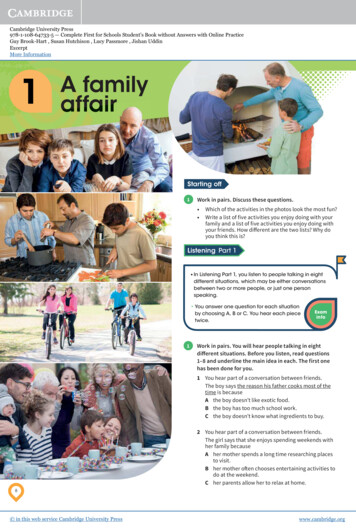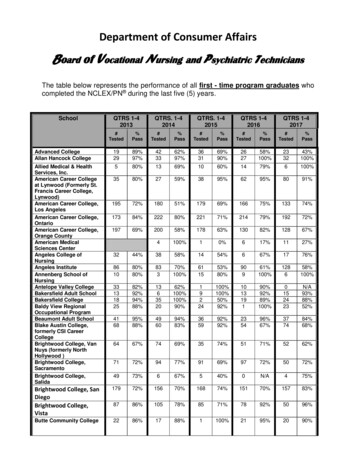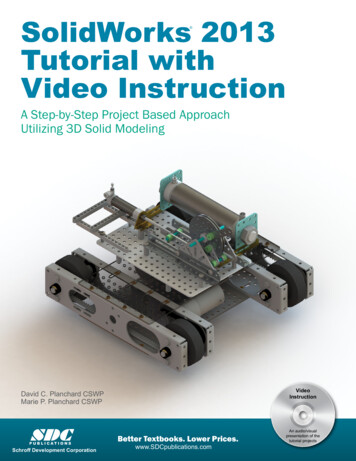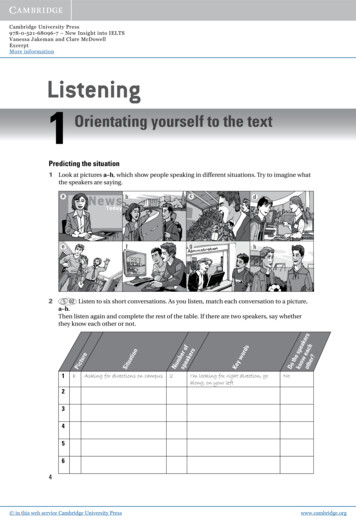
Transcription
Cambridge University Press978-1-108-64733-5 — Complete First for Schools Student's Book without Answers with Online PracticeGuy Brook-Hart , Susan Hutchison , Lucy Passmore , Jishan UddinExcerptMore Information1A familyaffairStarting off1Work in pairs. Discuss these questions. Which of the activities in the photos look the most fun?Write a list of five activities you enjoy doing with yourfamily and a list of five activities you enjoy doing withyour friends. How diferent are the two lists? Why doyou think this is?Listening Part 1 In Listening Part 1, you listen to people talking in eightdifferent situations, which may be either conversationsbetween two or more people, or just one personspeaking. You answer one question for each situationby choosing A, B or C. You hear each piecetwice.1infoWork in pairs. You will hear people talking in eightdiferent situations. Before you listen, read questions1–8 and underline the main idea in each. The first onehas been done for you.1 You hear part of a conversation between friends.The boy says the reason his father cooks most of thetime is becauseA the boy doesn’t like exotic food.B the boy has too much school work.C the boy doesn’t know what ingredients to buy.2 You hear part of a conversation between friends.The girl says that she enjoys spending weekends withher family becauseA her mother spends a long time researching placesto visit.B her mother oten chooses entertaining activities todo at the weekend.C her parents allow her to relax at home.8 in this web service Cambridge University Presswww.cambridge.org
Cambridge University Press978-1-108-64733-5 — Complete First for Schools Student's Book without Answers with Online PracticeGuy Brook-Hart , Susan Hutchison , Lucy Passmore , Jishan UddinExcerptMore Information13 You hear a girl talking to her brother on the phone.What has her brother done to annoy her?A He hasn’t done something he agreed to do.B He has bought the wrong present.C He has forgotten to buy a card.VocabularyPhrasal verbs14 You hear a boy taking part in a class discussion.His relationship with his brotherA was surprisingly better in the past.B was bad because they argued.C improved because of their parents’ actions.123455 You hear a girl talking to a friend.She says her sister didn’t tell her mum that she had gottwo new kittens becauseA her mother doesn’t like cats.B her room was too small for kittens.C her mother thought that one cat was enough.67891011126 You hear a boy leaving a message on his mother’s phone.He is calling his mother because he wants her toA tell his relatives that he can’t see them tonight.B allow him to stay at his friend’s house.C help him with his project.7 You hear an interview with a young chess champion.She says that the main reason for her success is thatA her father gave her a chess set when she was young.B she has been very lucky.C her family have helped her.8 You hear a boy talking to a friend.Why did the boy go to Denmark last summer?A He likes trying new things.B He always spends his holidays there.C The climate is better there.22cchill outcome up withset ofwork (something) outrely/depend on(someone)fall out with (someone)try (something) outhit it oflook out for(someone/something)take ater (someone)look up to (someone)look back at (something)a have an argument withsomeoneb immediately like eachother and becomefriendlyc relax and restd experiment with an ideae be able to trust someoneto do somethingf find an answer tosomethingg respect or admire anolder personh start a journeyi think of (an idea or plan)j think about something inthe pastk try to noticel be like a parent or oldersiblingComplete the sentences with a phrasal verb fromExercise 1 in the correct form.1 I used towith my cousins all thetime when I was younger, mostly because I didn’tagree with their opinions, but now I’m a bit olderwe’ve started to reallyas we seem tounderstand each other better.2 My mother is a really good artist. I’ve alwaysher because I’ve always known she’stalented. I really hope Iher so that I canmake a living out of art too.Listen and choose the best answer (A, B or C).3 I know I canbecause he alwaysWork in pairs. Correct the mistakes in questions 1–6.4 When I think about my childhood, Iallthe silly things I did, but at least I now know what toso that I can avoid making the samemistakes.023Match the phrasal verbs (1–12) from Listening Part 1 totheir definitions (a–l).How oten you do the cooking?You usually spend your weekends with your family?You have yet managed to get a present?Parents should limit the amount of time their childrenspend in front of a screen?5 How much pets you say you had at home?6 How you have become so successful?1234Martin if I’ve got a problemgood suggestions.5 My friend loves the weekend because she can get uplate and just. On weekday mornings,on the other hand, she’s up at 7 am as she has tofor school soon ater that.6 When Tomas has a problem, he otena few ideas before he finds the correct solution.It doesn’t matter what the situation is, he usuallyitin the end.A family affair in this web service Cambridge University Press9www.cambridge.org
Cambridge University Press978-1-108-64733-5 — Complete First for Schools Student's Book without Answers with Online PracticeGuy Brook-Hart , Susan Hutchison , Lucy Passmore , Jishan UddinExcerptMore Information1Reading and Use of English Part 61 In Reading and Use of English Part 6, you read a textof 500–600 words with six gaps where sentences havebeen removed.Work in pairs. You are going to read an article givingadvice to teenagers about how to get on better withtheir siblings (brothers and sisters). Before you read,write these adjectives in the correct column below.caring cheeky childish cooperativecritical energetic enthusiastic hardworkingirritating mature organised patientreliable responsible self-confident sensitivesympathetic thoughtful You choose one sentence from a list of sevensentences (A–G) for each gap; there is onesentence you willnot need.5adviceRead the article opposite carefully, ignoring the spaces,and make a note of the main idea of each paragraph.First paragraph:usually positiveGetting on with your siblings can be dificult, but it ispossible to have a good relationship.usually negativecaring6Six sentences have been removed from the article.Choose from the sentences (A–G) the one which fitseach gap (1–6). There is one extra sentence which youdo not need.Use the underlined words in the sentences and in thetext to help you.2Add one of these prefixes dis-, im-, in-, ir-, un- to each ofthe words to make opposites.uncooperativecooperativecritical enthusiasticmature organised reliable responsiblesensitive sympathetic3Work in pairs. Which of the adjectives in Exercise 1 doyou think typically describe older siblings in relation toyounger siblings? Why? Which describe younger siblingsin relation to older siblings? Why?4Work in groups. A It is also crucial that you are sensitive to the feelings ofyour siblings too.B Your siblings need to learn to take responsibility if theyhave done something wrong.C These arrangements will hopefully make both of youmore cheerful.D It is only natural that these developments will afectyour feelings towards members of your family.E But you should try not to let incidents like these havetoo big an efect on your relationship.F Indeed, it could seem impossible to imagine that youcould ever be friends.G This could be watching a series on television, joiningan exercise class or even preparing a family meal.Make a list of things teenage children sometimes sayabout their siblings.He’s really irritating!My parents always praise her. Discuss what you can do to live happily with yourbrothers and sisters.Be kind to them and try to be cooperative.10 in this web service Cambridge University Presswww.cambridge.org
Cambridge University Press978-1-108-64733-5 — Complete First for Schools Student's Book without Answers with Online PracticeGuy Brook-Hart , Susan Hutchison , Lucy Passmore , Jishan UddinExcerptMore Information1From worst enemies to best friendsEverybody feels irritated by their siblings from timeto time. Maybe your younger brother shows off andbehaves in an immature way when you invite yourfriends to your house. Or perhaps your hardworkingolder sister gets a lot of praise from your parents,making you feel like you are not trying hard enough.At times, your brother or sister can feel like yourworst enemy. 1But your relationship can improvegreatly with a bit of effort and understanding.loses or damages them, then of course it is your rightto be annoyed with her. 4It is important to learnto forgive your siblings for this kind of behaviour, justas you would forgive your close friends.In situations like these, it is really important to letyour sibling know how you feel. Rather than insultingSibling relationships can be especially difficult forteenagers, who are experiencing many changes totheir preferences and personality. 2For example,you may now find some of the activities that you usedto enjoy doing with your younger brother childish ora waste of time. At times, the age difference can feelbigger than it really is, and this can have a negativeeffect on your relationship.One way to solve this problem is to make sure youcontinue to include your brother or sister in your dayto-day life. Find an activity that you think you willboth enjoy and suggest that you do it together. 3If you do this activity regularly, you will soonremember how much fun it can be to spend timetogether, and you will start to get on better with eachother. This can take some time, so it is important to bepatient and enthusiastic.Of course, it is perfectlynormal for brothersand sisters to fall outwith one another oversmall things. Whenyou live together, it isonly natural that youwill get on each other’snerves from time totime. For example, ifyour younger sister isalways borrowing yourclothes without yourpermission and thenyour sister when she takes your things, tell her thatit makes you feel angry, and that you would feelmuch happier if she asked you first. 5Your olderbrother may be more popular with your parents forhis academic achievements, but he may also feel sadthat he is not so popular with you. By making an effortto understand each other’s feelings, your relationshipwill quickly improve.Finally, it is important to learn how to compromise.It is understandable that you may not want to lendyour favourite jumper to your unreliable sister, butmaybe you could offer her a less valuable alternativeitem of clothing. Or if your brother likes to spend allhis free time watching football and you find it boring,you could suggest a different sport that you followregularly together. 6And if you make the effort tomake your sibling happy, he or she will do the samefor you.A family affair in this web service Cambridge University Press11www.cambridge.org
Cambridge University Press978-1-108-64733-5 — Complete First for Schools Student's Book without Answers with Online PracticeGuy Brook-Hart , Susan Hutchison , Lucy Passmore , Jishan UddinExcerptMore Information17Work in groups of four. Two students should take therole of Brother/Sister A and two students should takethe role of Brother/Sister B. Read the role-play cards and decide as a group whatthe missing / borrowed item is going to be.Work with the student who has the same role as you.Read your role and prepare what you are going to say.When you are ready, change partners and have yourconversations.GrammarPresent perfect simple and continuousPage 162 Grammar reference11 a I’ve broken my personal record playing virtual tennis.b I’ve been playing virtual tennis all evening.Which sentence (a or b) talks about .1 the result of an activity?2 the length of an activity?Brother/Sister AYou recently received a special git for yourbirthday. When you looked for it the other day,it had gone missing. You think that your brother/sister may have taken it. You are annoyedbecause they oten take your things without asking this git is very important to you as it is somethingthat you had wanted for a long time.Have a conversation with your brother/sister.Find out what happened and decide how to avoidthis situation in the future.Brother/Sister BYou recently borrowed something belonging toyour brother/sister without asking them. Yousometimes do this because your brother/sisternever lets you borrow their things.Have a conversation with your brother/sister.Explain what happened and discuss how to avoidthis situation in the future.Look at the pairs of sentences in italics and answer thequestions that follow.2 a I’ve been learning how to bake bread.b I’ve phoned her more than six times, but she neveranswers the phone.Which sentence (a or b) talks about .1 how many times something has been repeated?2 changes or developments which are not finished?3 a I’ve been helping my mum while her assistant is onholiday.b We’ve lived in this house since I was a small child.Which sentence (a or b) talks about somethingwhich is .1 temporary?2 permanent?2Complete the sentences with the present perfect simpleor continuous form of the verbs in brackets.ve been visiting1 I’(visit) friends, so I haven’t spoken tomy parents yet today.2 My mum(ask) me to tidy my roomseveral times.3 I(clean) the kitchen, so what would youlike me to do next?4 Our neighbour(play) the violin for thelast three hours and it’s driving me mad!5 Congratulations! You(pass) the examwith really high marks!6 Adriana doesn’t know many people in our town yet.She(only live) here for a few weeks.7 We(spend) every summer in Cretesince I was a child, so it’ll be sad if we don’t go therethis year.8 I’m really tired because I(cook) all day!12 in this web service Cambridge University Presswww.cambridge.org
Cambridge University Press978-1-108-64733-5 — Complete First for Schools Student's Book without Answers with Online PracticeGuy Brook-Hart , Susan Hutchison , Lucy Passmore , Jishan UddinExcerptMore Information
the boy has too much school work. C the boy doesn t know what ingredients to buy. 2 You hear part of a conversation between friends. The girl says that she enjoys











